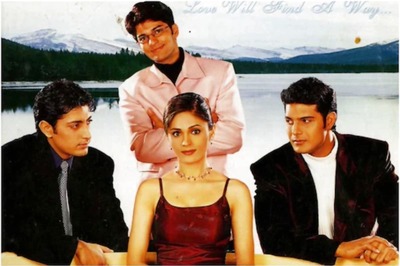
views
New Delhi: On August 16, 2018, an earthquake measuring 4.7 on the Richter scale struck the Nicobar Islands. This piece of news, however, was lost in the tsunami of grief caused by a tectonic shift in mainland India. The passing of Atal Bihari Vajpayee marked the end of an era, despite the former prime minister and statesman having retired from the public eye more than a decade ago.
Reams have been written about the poet-politician and reams more will be. His life, his career, even his favourite foods are all a matter of public knowledge and discourse, which will be re-examined and re-visited over the course of the next several days before the news cycle inexorably moves on.
The influence of the man and his decisions remain and will continue to shape the destiny of this country for the foreseeable future. But this particular piece is more about the past.
Being a typically irritating 8-year-old when Vajpayee assumed the Prime Minister’s Office for the first time in 1996, I was naturally more interested in plastic toys than political gaming. Little wonder then that his regrettably remarkable first term came and went without my noticing.
When he next assumed office, I was nearly 10, and while doubtless as irritating, I was a little less ignorant, aware now of the office of the Prime Minister and a vague knowledge of the man who then held it.
While that period of Indian politics was exemplified by a sort of revolving-door governance, where administrations were seemingly elected on which regional leader was in Delhi that month, Vajpayee stood out; even to a lout like the author of this piece. To employ an over-used phrase, there was just something about him.
It wasn’t merely his charisma, though he had plenty of it. It wasn’t only his gravitas, because below it lay evident more than a hint of mirth. And it wasn’t simply his advanced age, because the old man spoke with a younger one’s energy. But the exact term always eluded me, till much later.
In ancient Rome, there was a word ‘dignitas’, for which there is no direct English translation. It referred to a catch-all term for a person’s social conduct, bearing, public standing, personal reputation, as well as moral and ethical integrity, all of which combined to determine their sense of worth and influence on their society and its governance.
Vajpayee then was one of those rare individuals who commanded ‘dignitas’, and it was with this quality that he crafted a new façade for India, which helped influence the way the world perceived our country as well as its citizens. As a skilled orator, he proved that language needn’t dilute perception — something he had already proved in a less public, but no less influential, forum with his speech at the UN, which he delivered in chaste Hindi.
Among the many many caretaker governments that were in a semblance of power during the 90s, helmed by leaders with various competencies but little individuality, Vajpayee was the outlier. And not just because the Buddha Smiled during his second term, though it undoubtedly helped. Even the most vacuous of kids were exposed to the word, Pokhran, and while we may not have known of its exact meaning, we appreciated its import, and perhaps subliminally made aware that we were beginning to play a larger role on the world stage.
With the effects of our nascent economic liberalisation becoming more evident (credit where credit is due), we finally had a new leader who seemed capable enough to chart India’s course through this climate of change and, perhaps more importantly, was palatable enough to other world leaders to change how the global polity viewed us. A most personable man, Vajpayee managed to not only forge working relationships with world leaders, as disparate as US’s Clinton and Russia’s Putin, but cordial ones. This helped usher in our own glasnost, which had far-reaching consequences.
His bonhomie wasn’t limited to diplomatic interactions, but was apparent in the way he dealt with parliamentarians, irrespective of their political leaning, the media, public personalities and the general public. Those who were unaware of (or uninterested in) his poetic oeuvre knew of his sincere love for food and drink while others were familiar with his fascination with films, and others still were familiar with his sly, penetrating wit.
All these characteristics, not least of which was his exuberant enjoyment of meats and seafood, helped, by default, soften peoples’ perception of his party and what they stood for. This especially held true for the educated urban middle class, who prided themselves on their liberal leanings, and saw Vajpayee (and by extension, the BJP) as representative of Hinduism, and not Hindutva. The part that this new perception played in more recent events is inestimable.
The first ever political speech I remember was Vajpayee’s Independence Day speech in 1998, and while his message escapes me, the way he carried himself and the manner with which he spoke is as fresh in my mind’s eye as were the prawns the former PM was so fond of. For some reason, that speech, and the man who delivered it, seemed to matter. Twenty years later, the man matters so much more, and the reason utterly tangible. His words, however, will be missed.
As may be evident from its headline, this obituary was written by a millennial and for many of my generation, Vajpayee was our introduction to the world of Indians politics, and its subsequent impact on the country’s place in the world. And that introduction may have been immersive for some of us, while fleeting for others, but, for all of us, it was a realization of a world that existed beyond the clearly defined boundaries of home, school and playground, as well as our place in it, which is no mean feat. One could even pen a poem of it.














Comments
0 comment